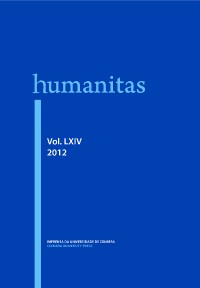Please use this identifier to cite or link to this item:
https://hdl.handle.net/10316.2/27398| DC Field | Value | Language |
|---|---|---|
| dc.contributor.author | Leão, Delfim F. | - |
| dc.contributor.other | Faculdade de Letras da Universidade de Coimbra. Instituto de Estudos Clássicos (ed. lit.) | - |
| dc.date.accessioned | 2013-12-19T14:41:27Z | |
| dc.date.accessioned | 2020-10-02T17:02:46Z | - |
| dc.date.available | 2013-12-19T14:41:27Z | |
| dc.date.available | 2020-10-02T17:02:46Z | - |
| dc.date.issued | 2012 | - |
| dc.identifier.issn | 2183-1718 | - |
| dc.identifier.uri | https://hdl.handle.net/10316.2/27398 | - |
| dc.description.abstract | Começando por um enquadramento relativo ao lugar ocupado pelos estudos de direito grego antigo nos curricula universitários ocidentais, propõe-se uma reflexão sobre o tipo de saberes que é necessário conjugar para se obter um conhecimento mais amplo da lei na antiguidade clássica. Assim, a um conjunto de fontes que se repartem pela epigrafia, papirologia e, em sentido lato, por toda a literatura (desde a historiografia ao teatro, e desde os escritos filosóficos à prática forense), deve corresponder um esforço conjunto resultante da articulação entre historiadores, juristas, filólogos, epigrafistas e papirólogos. Este carácter variado das fontes para o estudo do direito grego (em particular o ático) corresponde, por outro lado, à forma como a cidadania e a administração da justiça eram praticadas no sistema da pólis – princípios que são também objecto de reflexão neste estudo. | por |
| dc.description.abstract | The paper starts with a short description of the status attributed to studies on ancient Greek law in the curricula of western universities, discussing the kind of knowledge that is necessary to combine in order to reach a deeper understanding of law in classical antiquity. Thereby, to the inquiry stimulated by an amount of sources distributed by epigraphy, papyrology and, in a wide sense, by the literature as a whole (from historiography to theatre, and from philosophical writings to forensic speeches), answers should be found in articulating the research made by historians, jurists, philologists, epigraphists, and papyrologists. The wide-range character of the sources available to the study of Greek law (in particular Athenian law) corresponds, on the other side, to the way citizenship and the administration of justice were promoted within the polis’ system – a topic that is also object of discussion in this study. | eng |
| dc.language.iso | por | - |
| dc.publisher | Imprensa da Universidade de Coimbra | - |
| dc.subject | law | eng |
| dc.subject | Attic law | eng |
| dc.subject | administration of justice | eng |
| dc.subject | ancient democracy | eng |
| dc.subject | lei | por |
| dc.subject | direito ático | por |
| dc.subject | administração da justiça | por |
| dc.subject | democracia antiga | por |
| dc.title | Fontes para o estudo do direito ático | por |
| dc.type | article | - |
| uc.publication.collection | Humanitas vol. LXIV | - |
| uc.publication.firstPage | 97 | - |
| uc.publication.lastPage | 113 | - |
| uc.publication.location | Coimbra | - |
| uc.publication.journalTitle | Humanitas | - |
| uc.publication.volume | 64 | por |
| dc.identifier.doi | 10.14195/2183-1718_64_6 | - |
| uc.publication.section | Artigos | - |
| uc.publication.orderno | 6 | - |
| uc.publication.area | Artes e Humanidades | - |
| uc.publication.manifest | https://dl.uc.pt/json/iiif/10316.2/27398/257591/manifest?manifest=/json/iiif/10316.2/27398/257591/manifest | - |
| uc.publication.thumbnail | https://dl.uc.pt/retrieve/12002302 | - |
| item.grantfulltext | open | - |
| item.fulltext | With Fulltext | - |
| Appears in Collections: | HVMANITAS | |
Files in This Item:
| File | Description | Size | Format | |
|---|---|---|---|---|
| humanitas64_artigo6.pdf | 468.58 kB | Adobe PDF |  |
Items in DSpace are protected by copyright, with all rights reserved, unless otherwise indicated.
